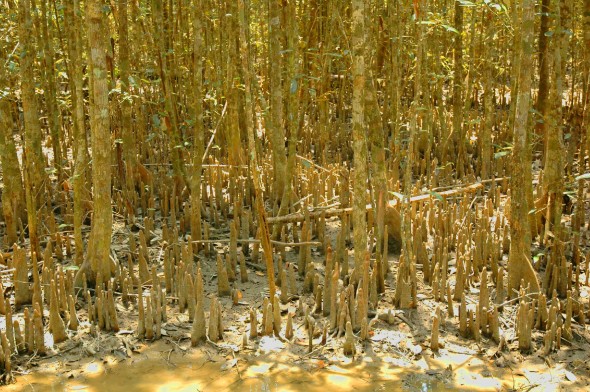TakePart/Participant Media | Oct. 30, 2015

The mangrove forest in Bangladesh’s portion of the Sundarbans. (Photo credit: Amio James Ascension/courtesy of Creative Commons)
A cargo barge carrying 570 tons of coal in Bangladesh has sunk in the world’s largest mangrove forest.
Tuesday night’s incident, which took place on the Poshur River, is the third spill in a year in the Sundarbans, which straddles the border with India. Last December, a ship spilled nearly 93,000 gallons of oil into a river in the Sundarbans after colliding with a cargo vessel, an incident that the Bangladeshi government called an ecological catastrophe. In May, a cargo loaded with fertilizer capsized in another river in the Sundarbans.
“In a worst-case scenario, it can cause fish kills and impact endangered fish species,” Donna Lisenby, a staffer with the international environmental organization Waterkeeper Alliance, said of the coal spill. “When a ship or barge loaded with coal sinks, it has big diesel fuel tanks that power the engines, batteries containing lead acid, and hydraulic fluids that all go underwater.”
She noted that coal contains heavy metals such as arsenic, cadmium, chromium, lead, and mercury that can contaminate the river.
Local news outlets have reported that the ship’s captain and nine sailors were rescued.
Lisenby said local Waterkeeper affiliates who arrived at the scene the morning after the incident told her they did not witness any action taken by the Bangladeshi government or by the company that owns the ship.
“They were there throughout most of the day on Wednesday and didn’t see any buoys or lights to warn other vessels where the ship had sunk,” she said. “They didn’t see any cleanup or any oil response vessels either.”
One media outlet has reported that the government has formed a committee to investigate what happened and assess the incident’s impact on the mangrove forest.
Lisenby said the incident underscores the need to fight the Bangladeshi government’s plans to build a 1,320-megawatt coal-fired power plant at the edge of the Sundarbans.
“If the proposed Rampal coal plant is not stopped, it will result in an exponential increase in coal barge traffic through the Sundarbans,” Sharif Jamil, a leader of BAPA, Bangladesh’s largest environmental organization, said in a statement. “This incident shows that current safety precautions governing boat traffic through the Sundarbans are not sufficient to prevent accidents that put tons of fossil fuel pollutants in the water.”
Lisenby, who visited the Sundarbans in May, said that more than 4.7 million tons of coal needed to fuel the power plant annually would have to be transferred by hand from large barges to smaller boats, because the rivers leading north to the proposed project site are too shallow to handle larger vessels.
Bangladesh, which signed an agreement with the Indian government to build the power plant three years ago, released an environmental impact assessment for the project in 2013. Lisenby said that although the assessment contained more than 30 issues that needed to be addressed, the government has moved forward with the project.
Three companies submitted bids for the power plant’s construction. Last month, the Bangladeshi government told the Dhaka Tribune that it plans to award the contract in January 2016.
Waterkeeper Alliance wants UNESCO to place Sundarbans on the list of endangered World Heritage Sites.
“The government responsible for protecting it isn’t doing its job,” Lisenby said.